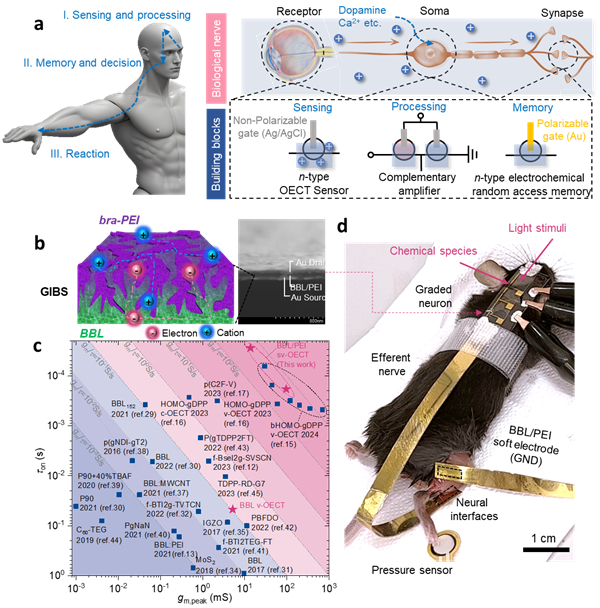XJTU develops chemically tunable artificial neuron featured in Nature Electronics

Experimental data and schematic illustrations from the study.
A research team led by Professor Ma Wei from the State Key Laboratory for Mechanical Behavior of Materials at Xi'an Jiaotong University (XJTU) has developed a high-performance artificial neuron with chemical tunability. Their breakthrough study, titled "A high-frequency artificial nerve based on homogeneously integrated organic electrochemical transistors", has been published in the prestigious journal Nature Electronics.
Assistant Professor Wang Shijie is the paper's lead author, with Ma, Associate Professor Zhao Chao, and Assistant Professor Wang Bingjun serving as co-corresponding authors.
The team achieved a major technological breakthrough by designing a vertical organic electrochemical transistor (v-OECT) featuring a gradient interpenetrating bicontinuous structure (GIBS). This innovative design enabled several notable advancements: a high voltage gain of 248 V/V and a cutoff frequency of 1.5 kHz; high-frequency conductance read-write capabilities up to 100 kHz; and calcium ion-mediated signal processing at frequencies above 250 Hz. In animal experiments, the artificial neuron successfully restored the conditioned reflexes of mice with impaired neural function.
The new device significantly outperforms traditional technologies. Its response speed is 2,000 times faster than that of conventional devices, and its pulse firing rate is five times higher than previous OECT circuits. Remarkably, it operates across the entire refresh frequency range of known biological neurons, reaching up to 1 kHz.
This technological advance holds great promise for medical applications, offering a novel approach for treating conditions such as spinal cord injuries and peripheral nerve damage. It also contributes to the development of brain-machine interface technologies.
In a commentary published alongside the article, a research team from the University of Chicago noted that this work is poised to have a significant impact on the fields of neural repair and brain-machine interfaces.

